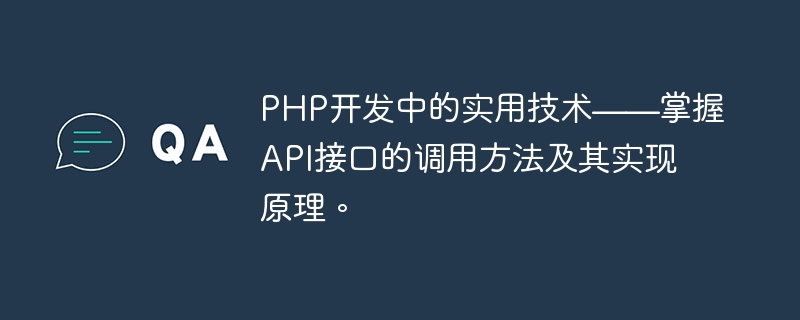Home >Backend Development >PHP Tutorial >Practical techniques in PHP development - master the calling methods of API interfaces and their implementation principles.
Practical techniques in PHP development - master the calling methods of API interfaces and their implementation principles.
- WBOYWBOYWBOYWBOYWBOYWBOYWBOYWBOYWBOYWBOYWBOYWBOYWBOriginal
- 2023-09-05 12:03:311309browse

Practical technology in PHP development - master the calling method of API interface and its implementation principle
With the rapid development of the Internet, API (Application Programming Interface) interface It plays an increasingly important role in web development. Through API interfaces, we can interact with other applications, services or platforms to achieve data expansion and integration of various functions. As a PHP developer, mastering the calling methods of API interfaces and their implementation principles is crucial to improving development efficiency and function implementation. This article will introduce the calling method of the API interface and its implementation principle, and provide relevant code examples for readers' reference.
1. API interface calling method
- RESTful API
REST (Representational State Transfer) is a software architecture style that uses GET, POST, and PUT of the HTTP protocol , DELETE and other methods to operate resources. RESTful API is an API interface based on REST design principles. Its calling method is simple and clear, and it is widely used in Internet development.
Call the RESTful API through HTTP GET:
$url = 'http://api.example.com/users'; $response = file_get_contents($url); $data = json_decode($response, true);
Call the RESTful API through HTTP POST:
$url = 'http://api.example.com/users';
$data = array('name' => 'John', 'age' => 25);
$options = array(
'http' => array(
'method' => 'POST',
'header' => 'Content-type: application/x-www-form-urlencoded',
'content' => http_build_query($data)
)
);
$context = stream_context_create($options);
$response = file_get_contents($url, false, $context);- SOAP API
SOAP (Simple Object Access Protocol) is an XML-based protocol used to make remote calls in web services. Through the SOAP API, we can interact with the server by sending SOAP messages.
Calling remote methods through SOAP API:
$client = new SoapClient('http://api.example.com/soap-service?wsdl');
$response = $client->getUserInfo(array('userId' => 123));- OAuth API
OAuth is an authorization framework used to protect access authorization of API interfaces. Through the OAuth API, users can securely pass their authentication information to the API interface to achieve secure data interaction.
Call API interface through OAuth 2.0:
$clientId = 'your_client_id';
$clientSecret = 'your_client_secret';
$url = 'http://api.example.com/oauth/token';
$data = array(
'grant_type' => 'client_credentials',
'client_id' => $clientId,
'client_secret' => $clientSecret
);
$options = array(
'http' => array(
'method' => 'POST',
'header' => 'Content-type: application/x-www-form-urlencoded',
'content' => http_build_query($data)
)
);
$context = stream_context_create($options);
$response = file_get_contents($url, false, $context);
$accessToken = json_decode($response)->access_token;
// 使用获取到的accessToken调用其他API接口
$url = 'http://api.example.com/users';
$options = array(
'http' => array(
'method' => 'GET',
'header' => 'Authorization: Bearer ' . $accessToken
)
);
$context = stream_context_create($options);
$response = file_get_contents($url, false, $context);
$data = json_decode($response, true);2. Implementation principle of API interface
Whether it is RESTful API or SOAP API, the bottom layer is based on HTTP Protocol for data exchange. The server opens the API interface to external users, receives external requests through the HTTP protocol, then performs corresponding processing on the server side, and returns the processing results to the client.
For RESTful API, we usually use HTTP methods such as GET, POST, PUT, and DELETE to operate resources. The client passes different parameters through HTTP requests, and the server executes corresponding business logic based on the different parameters, and then returns the results in the form of an HTTP response.
For SOAP API, its communication method is similar to Web services. Message interaction is carried out through the SOAP protocol, and both request messages and response messages are transmitted in XML format. The client calls the remote method by sending a SOAP message. The server parses the SOAP message, executes the corresponding business logic, and encapsulates the processing result into a SOAP message and returns it to the client.
For API interfaces that use OAuth for authorization, the process is roughly as follows:
- The client sends an authorization request to the server and provides its own authentication information;
- The server verifies the authentication information provided by the client and returns an AccessToken;
- The client uses the AccessToken to send an API request to the server, and the server verifies the validity of the AccessToken and executes the corresponding business logic according to the request;
- The server returns the processing results to the client.
Summary:
It is crucial for PHP developers to master the calling methods of API interfaces and their implementation principles. This article introduces the calling methods of RESTful API, SOAP API and OAuth API, and provides relevant code examples. By mastering these technologies, we can better implement data interaction with other applications, services or platforms, adding more functionality and scalability to our applications. I hope this article will be helpful to your API interface calls, and I also hope that readers can further learn and apply these technologies in practice and improve their development level.
The above is the detailed content of Practical techniques in PHP development - master the calling methods of API interfaces and their implementation principles.. For more information, please follow other related articles on the PHP Chinese website!

